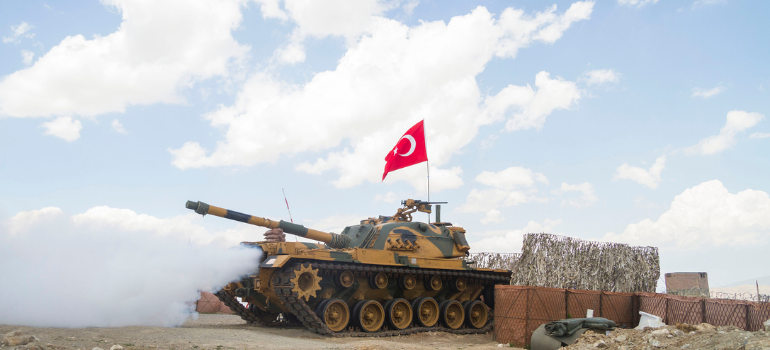
On 21 March 2023, the Independent International Commission of Inquiry on the Syrian Arab Republic (the Commission of Inquiry) presented its annual report to the plenary session of the 52nd session of the UN Human Rights Council.
CETIM intervened in the debate to raise the issue of violence and policies aimed at changing the ethnic composal in the context of the military occupation of Northern and Eastern Syria by Turkey and its militias.
This UN Commission, established in 2011 and composed of independent experts, is an international investigative body mandated to monitor the human rights situation in Syria. However, it has not addressed Turkey’s role in the conflict and its negative consequences for the human rights of the Syrian population. Since the military occupation of the territory in 2018-2019 by the Turkish military, the civilian population in northern and eastern Syria has been subjected to constant repression, including shelling, extrajudicial killings by drones and other forms of violence. As a direct consequence of this situation, thousands of people are fleeing their homes to seek refuge in neighbouring countries or in Europe.
This situation has been further exacerbated since the February 2023 earthquakes. The Turkish and Syrian governments are blocking humanitarian aid to the most affected regions (mainly in the north), leaving millions of civilians without any assistance in a situation of large-scale humanitarian catastrophe.
In addition, CETIM has received other alarming information from direct testimonies from partner organisations on the ground, in particular the Afrin Human Rights Organisation. According to the latter, within the framework of the military and illegal occupation of the territory, and taking advantage of the context of the Syrian civil war and the devastating earthquakes that have forced the displacement of millions of people, Turkey is building hundreds of houses with humanitarian funds to repopulate the area with Turkish and Arab families. The aim is to alter the ethnic demography in the region, thus exacerbating political and social tensions, but also attempts at ethnic cleansing of the region’s minorities.
The construction of these settlements is done through Qatari charities foundations, such as Qatar Charity. This foundation publicly boasts of the opening of two model villages, Al Rayyan Model City and Dohat Al-Khair City, both located on the Turkish-Syrian border.
These developments are part of Erdoğan’s neo-Ottoman strategy, which aims to put Ankara back at the centre of the Levantine and Middle Eastern game. In this regard, control of northern and eastern Syria, and in particular its ethnic minorities, is crucial.
In the light of the aboce, CETIM directly questioned the Commission of Inquiry during the presentation of its report, asking whether it was aware of the situation described here and what measures could be taken against such strategies of demographic change.
CETIM will continue to follow closely the developments on the ground and contribute to ending the foreign occupation of Syrian territory, while respecting the fundamental rights of all peoples.